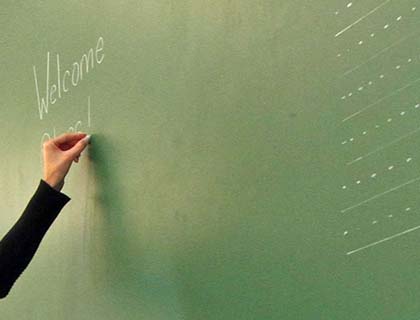Human beings come to this world with an innate desire for learning. Since the very early days of his childhood till he is an old man the process of learning continues. As the knowledge is limitless, the capability of human beings to learn is also infinite. It never ends and it is difficult to gauge the amount of knowledge a person learns within his lifetime. And it is this capacity to learn that human beings have been able to dominate the world and the living beings present on it; even, he has extended the limits of his learnings to other planets and stars and to other galaxies.
The first institution where human beings start their learning is a family. The parents are, thus, the first teachers. It is through parents that children start learning a language and form the foundations on which they construct the building of their knowledge. Parents prepare the children for what they are going to learn in the years to come. Parents, in fact, do not install the urge for learning within the children. The urge to learn and the thirst to know are already there. The parents only require to keep that alive; or even assist in increasing that.
However, on certain occasions, the parents discourage that urge and strive to install within the minds of the children what they know themselves. They want the children to be their carbon copies; copying what they teach them. The inquisitiveness, the curiosity and keenness that are the natural gifts of the children are thus spoiled in that case and the children become habitual of getting fed by their parents instead of searching for knowledge themselves.
Another institution that plays a tremendous role in supporting the children to learn is school. Though schools assist children in learning to a great extent, they can also be responsible for snatching from children their precious gift – the capacity to learn. Certain schools use the methods and ways that are not at all supportive in learning; rather, they discourage children to a large extent. The use of fear is one of the most dominant factors in such methods, and is highly responsible for killing the students’ craving to learn. Stanley Kubrick puts this concept in the most appropriate words: “I think the big mistake in schools is trying to teach children anything and by using fear as the basic motivation. Fear of getting failing grades, fear of not staying with our class, etc. Interest can produce learning on a scale compared to fear as a nuclear explosion to a firecracker.”
Teachers, therefore, must strive to keep the students’ craving for learning alive instead of inculcating in them the readymade thoughts and concepts. Teachers must support the students in polishing their capacities to develop their own understanding, instead of making them repeat like parrots. The true teachers, as Nikos Kazantzakis says are those who use themselves as bridges over which they invite their students to cross; then, having facilitated their crossing, joyfully collapse, encouraging them to create their own.
The habit of learning keeps a person updated and ready to face the overgrowing changes of changing world. As, with each passing moment the universe is expanding and along with it the knowledge, it is essential that human beings must never give up the habit of learning. At the end of each day a person must have something new that he has learnt. It is the only way that a person can remain updated and young. He, in this manner, never gets old and outdated. As the famous writer Mark Twain had said, “Anyone who stops learning is old, whether twenty or eighty. Anyone who keeps learning stays young. The greatest thing you can do is keep your mind young”.
For human beings to keep on learning the central concept is to consider that a person has never learnt enough. As the great philosopher Aristotle used to say, “I know that I don’t know anything.” It is the very basic step. The realization that a person knows that he knows not leads to true learning. On the other hand the ones who believe that they are not ignorant and know everything, for them all the doors to learning are automatically closed. They, from the very first step, deny to open the vistas of knowledge to themselves. They are basically the blind believers who are unfortunately sure that they have enough knowledge, while on the contrary, they are the ones who need the most of it. And, they are, undoubtedly, the most ignorant of all.
Vera Nazarian quotes in The Perpetual Calendar of Inspiration, “It's a fact—everyone is ignorant in some way or another. Ignorance is our deepest secret. And it is one of the scariest things out there, because those of us who are most ignorant are also the ones who often don't know it or don't want to admit it.
Here is a quick test: If you have never changed your mind about some fundamental tenet of your belief, if you have never questioned the basics, and if you have no wish to do so, then you are likely ignorant. Before it is too late, go out there and find someone who, in your opinion, believes, assumes, or considers certain things very strongly and very differently from you, and just have a basic honest conversation. It will do both of you good.”

